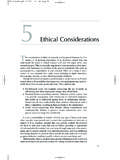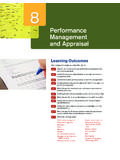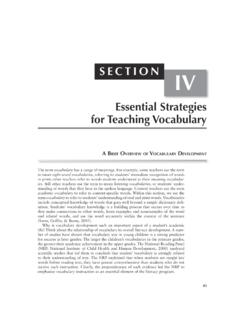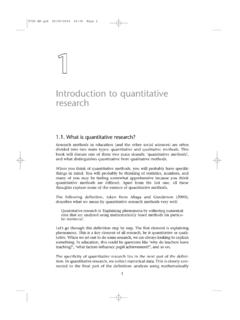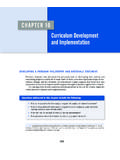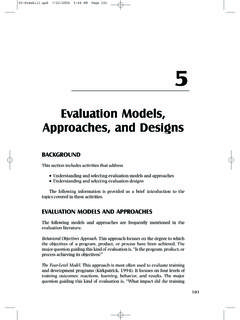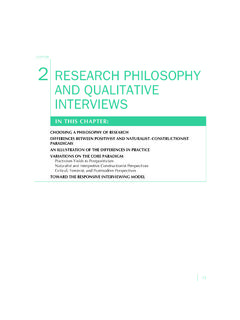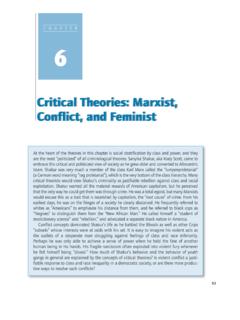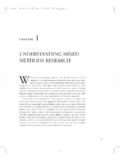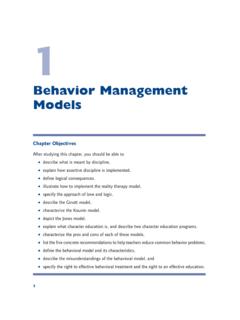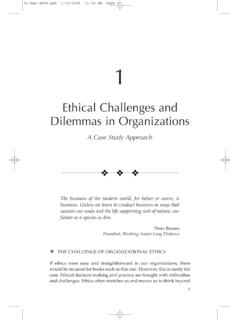Transcription of Ethical Challenges and Dilemmas in Organizations
1 11 Ethical Challenges andDilemmas in OrganizationsA Case Study ApproachThe business of the modern world, for better or worse, isbusiness. Unless we learn to conduct business in ways thatsustain our souls and the life supporting web of nature, ourfuture as a species is BarnesPresident, Working Assets Long Distance THE CHALLENGE OF ORGANIZATIONAL ETHICSIf ethics were easy and straightforward in our Organizations , therewould be no need for books such as this one. However, this is rarely thecase.
2 Ethical decision making and practice are fraught with difficultiesand Challenges . Ethics often stretches us and moves us to think beyond 1/16/2006 11:38 AM Page 1our own self to consider others: our family, our work group, ourorganization, our country, our culture. At the least, when we considerour own ethics, we have to ask ourselves: What is my own Ethical posi-tion or stance? How is that similar to, or different from, others ? Willmy actions have the intended consequences?
3 What unintended conse-quences might arise from my actions?These are challenging questions to ask at a personal level. We mustconsider what we deem appropriate and inappropriate, acceptable andunacceptable, right and wrong for ourselves but also in relation toothers. At an organizational level, such issues can become complex, if notdaunting. Given the rise of organizational power and influence, the poten-tial impact of decisions is, in some cases, profound and far-reaching.
4 StanDeetz (1992) reminds us that, by many standards , the business organiza-tion has become the central institution in modern society, often eclipsingthe state, family, church , and community in power. Organizations pervademodern life by providing personal identity, structuring time and experi-ence, influencing education and knowledge production, and directingnews and entertainment. From the moment of our birth to our death, orga-nizations significantly influence our lives in ways that often go is, over time, we have developed naturalized, taken-for-grantedideas about how Organizations should function and the role that theyshould play both in our personal lives and in our culture.
5 One of the goalsof this book, then, is to raise your awareness regarding many of our com-monsense assumptions about Organizations , particularly when it comesto ethics. After you have read this book, I hope that you will have devel-oped the awareness to pursue Ethical questions and establish your ownviews on organizational ethics. A second goal of the book is to strengthenyour Ethical reasoning and decision making. It is not enough to be awareof organizational ethics; it also requires strong critical-thinking skills tounderstand Ethical situations and possible courses of action.
6 After youhave read this book, you will have developed these skills as you learnabout Ethical theories, in general, and Ethical practices, specifically. Hope-fully, you will have greater confidence in your own decision making andyou will better understand the decisions of others. Finally, a third goal isto motivate you to respond to, and proactively confront, Ethical dilemmasthat may arise in your organizational life. Overall, it is my hope that, afterreading this book, you will believe that organizational ethics matters and that you will use your knowledge, skill, and motivation to enhancethe ethics of our Organizations today and in the stakes in organizational decisions can be particularly high:How safe is a particular product or service?
7 Does it have negative2 CASE STUDIES IN ORGANIZATIONAL 1/16/2006 11:38 AM Page 2effects on its users? How should employees be hired, trained,developed, compensated, or fired? How should wealth be developedand distributed? What effect does the accumulation of wealth haveupon social, economic, political, and technological disparities withothers? How do Organizations impact our values, our families, and ourcommunities? Whose definition of ethics is dominant in an increas-ingly global economy?
8 These questions are certainly not exhaustiveand you may come up with many others that are relevant to of the question, it is clear that the consequences oforganizational actions can be great for all of us. Yet, at the same time,the Ethical demands on Organizations are neither extraordinary norexcessive, according to Al Gini (2005):A decent product at a fair price; honesty in advertisements; fairtreatment of customers, suppliers, and competitors; a strong senseof responsibility to the communities [they] inhabit and serve; andthe production of a reasonable profit for the financial risk-taking ofits stockholders and owners.
9 (p. x)It is worth noting, however, that not all Organizations seek to pro-duce a profit for stockholders and owners. Others are more interestedin the social welfare of citizens across the world (Bonbright, 1997;Bornstein, 2004). For example, Ashoka, founded by Bill Drayton, is anon-governmental organization that operates in 46 countries and hasassisted over 1,400 social entrepreneurs interested in improving humanrights, education, environmental protection, rural development, healthcare, and poverty, among is also important to remember that our organizational lives arenot separate or distinct from other realms of our lives.
10 For example, itis increasingly difficult to distinguish between our public and privatelives, work and family, labor and leisure (May, 1993). As a result, it iscrucial that we keep in mind that Organizations are a part of life. Theyare not silos that function in a vacuum without direct effects on all ofus. For better or worse, they are part and parcel of us. THE CURRENT STATE OF ORGANIZATIONAL ETHICSIn an era of widespread organizational scandals, it is appropriate thatwe study organizational ethics more closely.
